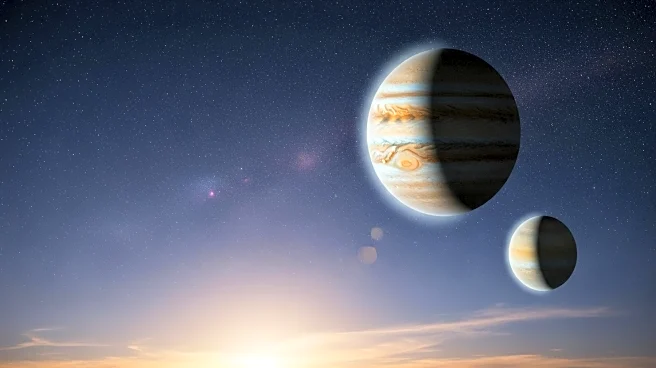What is the story about?
What's Happening?
Jupiter and Venus are prominently visible in the pre-dawn sky, according to Astronomy Magazine. Jupiter rises at approximately 1:30 AM and Venus at 4:15 AM local daylight time. Jupiter, with a magnitude of -2.0, is significantly brighter than the stars Pollux and Castor in the Gemini constellation. Venus, with a magnitude of -3.9, is exceptionally bright in the eastern sky near the constellation Leo, about 10° above the horizon around 5:15 AM. The planets are positioned along the ecliptic, an imaginary line marking the plane of Earth's orbit around the Sun. Over the next few days, Venus will approach Regulus, Leo's alpha star, which currently lies about 7.5° to Venus' lower left.
Why It's Important?
The visibility of Jupiter and Venus in the pre-dawn sky offers a unique opportunity for both amateur and professional astronomers to observe these celestial bodies. Their brightness and position along the ecliptic make them easily identifiable, providing a practical demonstration of planetary motion and alignment. This event can enhance public interest in astronomy and encourage educational activities related to space observation. Additionally, such celestial events can inspire scientific curiosity and foster a greater appreciation for the dynamics of our solar system.
What's Next?
In the coming days, Venus will continue to move closer to Regulus, providing an ongoing spectacle for sky watchers. This movement can be tracked to observe the changing positions of celestial bodies over time. Astronomy enthusiasts and educators may organize viewing events or workshops to capitalize on this opportunity, potentially increasing public engagement with astronomy. The continued visibility of these planets may also lead to further discussions and explorations of astronomical phenomena.
Beyond the Headlines
The alignment of Jupiter and Venus along the ecliptic highlights the interconnectedness of celestial mechanics and the predictability of planetary movements. This event underscores the importance of astronomy in understanding our place in the universe and can serve as a reminder of the vastness and complexity of space. It also presents an opportunity to reflect on the historical significance of planetary observations in shaping human knowledge and culture.
















